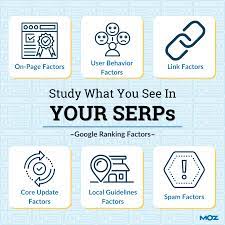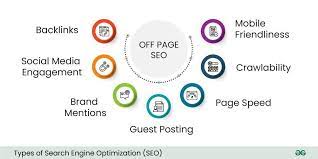The Basics of SEO: A Beginner’s Guide
Search Engine Optimization (SEO) is a crucial aspect of digital marketing that helps improve a website’s visibility on search engines like Google. Understanding the basics of SEO is essential for anyone looking to enhance their online presence and reach a wider audience.
Keywords
Keywords are the foundation of SEO. These are the terms and phrases that users type into search engines to find relevant information. Conduct keyword research to identify the most relevant keywords for your website and strategically incorporate them into your content.
On-Page Optimization
On-page optimization involves optimizing individual web pages to improve their search engine rankings. This includes optimizing meta tags, headings, images, and content with relevant keywords. Ensure your website is user-friendly and loads quickly to enhance user experience.
Quality Content
Creating high-quality, relevant content is essential for SEO success. Content that provides value to users is more likely to rank higher on search engine results pages (SERPs). Regularly update your website with fresh and engaging content to attract both users and search engines.
Link Building
Link building is another crucial aspect of SEO. Acquiring backlinks from reputable websites can improve your website’s authority and credibility in the eyes of search engines. Focus on building quality backlinks through guest posting, social media sharing, and collaborations with other websites.
Mobile-Friendliness
In today’s mobile-first world, having a mobile-friendly website is essential for SEO success. Ensure your website is responsive and optimized for mobile devices to provide a seamless user experience across all platforms.
Monitoring and Analysis
Regularly monitor your website’s performance using tools like Google Analytics. Analyze key metrics such as organic traffic, bounce rate, and conversion rates to track the effectiveness of your SEO efforts. Use this data to make informed decisions and continually optimize your website for better results.
By mastering the basics of SEO and implementing best practices, you can enhance your online visibility, attract more organic traffic, and grow your business in the competitive digital landscape.
6 Essential SEO Tips to Boost Your Website’s Visibility
- Create high-quality, relevant content for your website.
- Use relevant keywords strategically throughout your content.
- Optimize your website’s meta tags, including title tags and meta descriptions.
- Improve your website’s loading speed for better user experience.
- Build backlinks from reputable websites to increase your site’s authority.
- Regularly monitor and analyze your website’s performance using SEO tools.
Create high-quality, relevant content for your website.
Creating high-quality, relevant content for your website is a fundamental tip in basic SEO. Content that is valuable to users not only helps your website rank higher on search engine results pages but also engages and retains visitors. By focusing on providing informative and engaging content that addresses the needs and interests of your target audience, you can establish credibility, attract organic traffic, and enhance your overall online presence. Remember, quality content is key to building a strong foundation for successful SEO strategies.
Use relevant keywords strategically throughout your content.
Using relevant keywords strategically throughout your content is a fundamental aspect of effective SEO. By incorporating keywords that align with your target audience’s search queries, you can improve your website’s visibility on search engine results pages. It is essential to seamlessly integrate these keywords into your content in a natural and meaningful way to enhance both user experience and search engine rankings. Remember, relevance and strategic placement of keywords play a key role in driving organic traffic to your website and reaching your desired audience effectively.
Optimize your website’s meta tags, including title tags and meta descriptions.
Optimizing your website’s meta tags, such as title tags and meta descriptions, is a fundamental aspect of basic SEO. Title tags are the first thing users see on search engine results pages (SERPs), so they should accurately reflect the content of each page while incorporating relevant keywords. Meta descriptions provide a brief summary of the page’s content and can influence click-through rates. By crafting compelling and keyword-rich meta tags, you can improve your website’s visibility in search results and attract more organic traffic to your site.
Improve your website’s loading speed for better user experience.
Improving your website’s loading speed is a crucial tip for basic SEO. A faster loading website not only enhances user experience but also positively impacts your search engine rankings. Users are more likely to stay on a website that loads quickly, leading to lower bounce rates and higher engagement. By optimizing your website’s loading speed, you create a seamless and enjoyable browsing experience for visitors, ultimately boosting your site’s overall performance and visibility in search engine results.
Build backlinks from reputable websites to increase your site’s authority.
Building backlinks from reputable websites is a fundamental strategy in SEO to enhance your site’s authority and credibility. By earning links from trusted sources, you signal to search engines that your website is a valuable resource worth ranking higher in search results. Quality backlinks not only drive traffic to your site but also improve its reputation, ultimately boosting your visibility and standing in the competitive online landscape.
Regularly monitor and analyze your website’s performance using SEO tools.
Regularly monitoring and analyzing your website’s performance using SEO tools is essential for optimizing your online presence. By tracking key metrics such as organic traffic, keyword rankings, and user engagement, you can gain valuable insights into the effectiveness of your SEO efforts. These tools provide valuable data that allows you to identify areas for improvement, make informed decisions, and refine your strategy to enhance your website’s visibility on search engines. Consistent monitoring and analysis help you stay ahead of the competition and continuously improve your SEO performance for long-term success.




